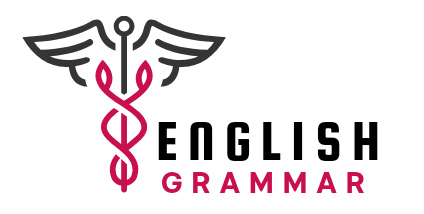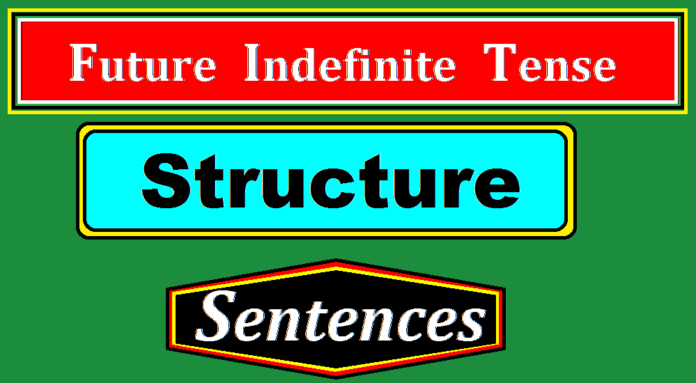What is the definition of the Future Indefinite Tense?, also called the Simple Future Tense, using (will/shall). Formation, Structure, Examples of Affirmative, Negative, Interrogative Sentences in English Grammar.
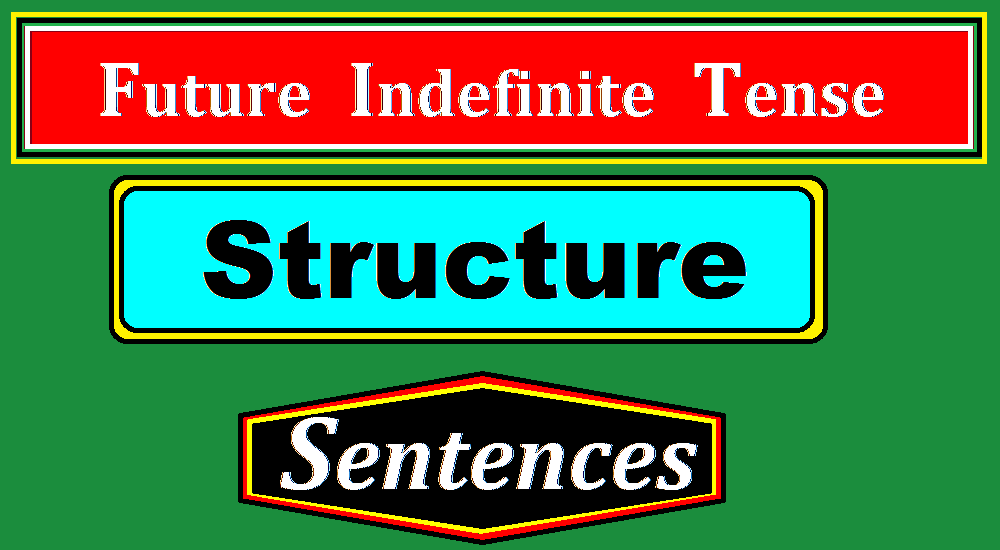
In this article, you will learn about the formation of future indefinite tense in a simple and easy way, how to make future sentences.
Definition Of The Future Indefinite Tense:
The future indefinite tense, sometimes called the simple future tense, is a grammatical verb form in English used to describe future events that are expected but have not yet occurred.
What Is the Future Indefinite Tense?
Actions or events that will happen later are expressed in the future indefinite tense. You can use this stress to predict future events when you are making plans, decisions, predictions, or promises.
Predictions: It will rain tomorrow.
Spontaneous decisions: I will call him now.
Promises and offers: We will help you.
Plans: They will travel next week.
These sentences tell us about actions that will happen at some point in the future.
For Example:
- When you say, I shall go to the gym tomorrow, you are using the future indefinite tense to express a future plan.
- If a sentence has two future tenses, the first part will be in the present indefinite and the second part will be in the future indefinite.
When I go to market, I shall bring toys for you.
The sentences in these two examples confirm that the actions are in the future tense.
The Full Structure Of Future Indefinite Tense
To indicate the future in affirmative, interrogative, and negative sentences, the first form of the verb is combined with the auxiliary verb (will/shall) to form the future indefinite tense.
1. Assertive Sentence Structure of Future Indefinite Tense
Future Indefinite Tense Assertive sentences are used positively without doubt or negation to describe future facts or upcoming events.
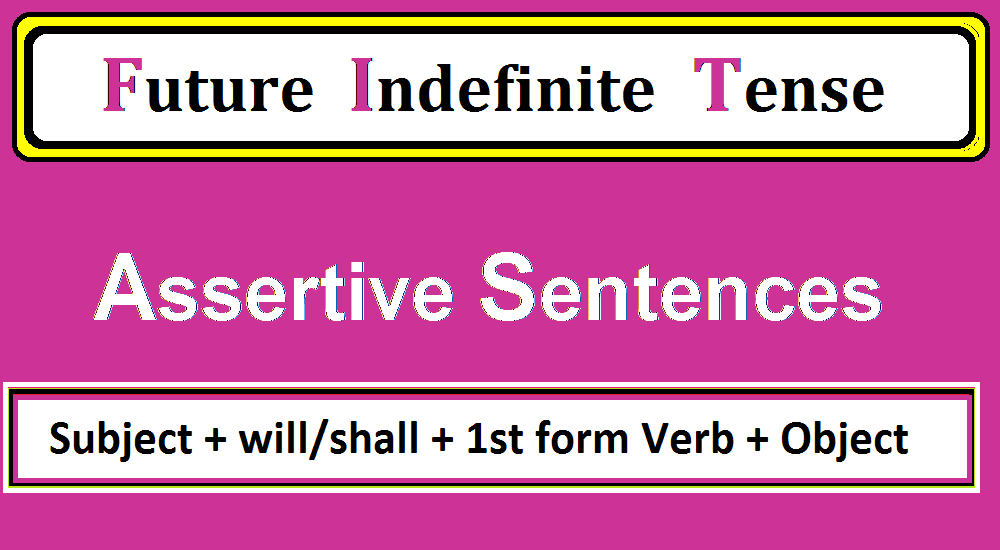
The future indefinite tense structure of an affirmative sentence is given.
Positive Formula of Future Indefinite Tense:
Future indefinite tense formula of positive sentence is the following;
Subject + (Helping Verb) will/shall + 1st form of verb + Object
In the formation of affirmative sentences, understanding the affirmative formula of the simple future tense will help you make correct sentences. The most commonly used helping verb is “will,” while “shall” is used with (“I” or “we”).
The sentence “I will return this book tomorrow” can be used if you are making a commitment to do something in the future.
Note Points:
There are some important points to form an assertive sentence in the simple future tense;
- The “first form” of the verb is used after the helping verb.
- The auxiliary verb (will/shall) is used after the subject in this tense.
- “Shall” is used with pronouns (I, We).
- “Will” is used with all singular plural nouns and pronouns.
- A full stop (.) is used at the end of a sentence to show a positive sentence in the future simple tense.
Assertive Sentences Examples of Future Indefinite Tense:
To form future indefinite tense examples of aggressive sentence exercises are given below.
- He will go to school tomorrow.
(Subject: He, Helping Verb: will, Main Verb: go, Object: to school tomorrow)
- She will serve the guests.
(Subject: She, Helping Verb: will, Main Verb: serve, Object: the guests)
- I shall go to collage after two days.
(Subject: I, Helping Verb: shall, Main Verb: go, Object: to collage after two days)
- We shall help the poor.
(Subject: We, Helping Verb: shall, Main Verb: help, Object: the poor)
- You will wait for me.
(Subject: You, Helping Verb: will, Main Verb: wait, Object: for me)
- They will work hard.
(Subject: They, Helping Verb: will, Main Verb: work hard)
- They will learn their lesson.
(Subject: They, Helping Verb: will, Main Verb: learn, Object: their lesson)
- Birds will fly in the air.
(Subject: Birds, Helping Verb: will, Main Verb: fly, Object: in the air)
- Ali will play hockey.
(Subject: Ali, Helping Verb: will, Main Verb: play, Object: hockey)
- You will take tea.
(Subject: You, Helping Verb: will, Main Verb: take, Object: tea)
- We shall finish our work.
(Subject: We, Helping Verb: shall, Main Verb: finish, Object: our work)
- We shall pray to God.
(Subject: We, Helping Verb: shall, Main Verb: pray, Object: to God)
- He will pay the fine.
(Subject: He, Helping Verb: will, Main Verb: pay, Object: fine)
- The boys will make a noise.
(Subject: The boys, Helping Verb: will, Main Verb: make, Object: a noise)
- We shall respect our parents.
(Subject: We, Helping Verb: shall, Main Verb: respect, Object: our parents)
- It will rain tomorrow.
(Subject: It, Helping Verb: will, Main Verb: rain, Object: tomorrow)
Positive expressions are expressed in these sentences, which indicate that the action will take place in the future.
2. Interrogative Sentence Structure of Future Indefinite Tense
Future Indefinite Tense Interrogative sentences are used to ask questions about future actions. These interrogative sentences are made with an auxiliary verb (will/shall) before the subject.
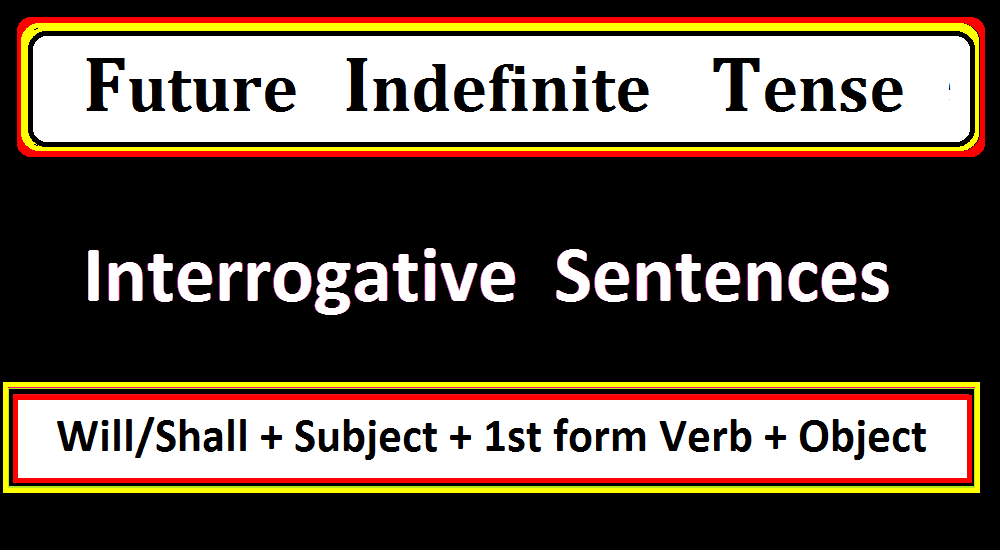
The future indefinite tense formation of an interrogative sentence is given.
Interrogative Formula of Future Indefinite Tense:
The future indefinite tense interrogative formula is the following;
(Helping Verb) Will/Shall + Subject + 1st form of verb + Object
In the formation of interrogative sentences, understanding the interrogative formula for the simple future tense will help you construct correct sentences.
Note Points:
There are some important points to form an interrogative sentence in the simple future tense;
- In interrogative sentence, the auxiliary verbs (will/shall) come before the subject to show a question sentence.
- “First form of verb” is used after the subject.
- A question mark (?) is placed at the end of a sentence to display the interrogative sentence in the future simple tense.
- If interrogative words (what, where, which, How, etc.) come in sentences, they are used at the beginning of the sentences before the helping verb (will/shall).
Interrogative Sentences Examples of Future Indefinite Tense:
Some examples of exercises for interrogative sentences in the future indefinite tense are;
- Will he go to school tomorrow?
(Helping Verb: Will, Subject: he, Main Verb: go, Object: to school tomorrow)
- Will you eat mangoes?
(Helping Verb: Will, Subject: you, Main Verb: eat, Object: mangoes)
- Will stars shine at night?
(Helping Verb: Will, Subject: stars, Main Verb: shine, Object: at night)
- Shall I go to Lahore next week?
(Helping Verb: Shall, Subject: I, Main Verb: go, Object: to Lahore next week)
- Shall we spend the vacations in Murree?
(Helping Verb: Shall, Subject: we, Main Verb: spend, Object: the vacations in Murree)
- Will you wait for me?
(Helping Verb: Will, Subject: you, Main Verb: wait, Object: for me)
- Will they buy a new house?
(Helping Verb: Will, Subject: they, Main Verb: buy, Object: a new house)
- Will they learn their lesson?
(Helping Verb: Will, Subject: they, Main Verb: learn, Object: their lesson)
- Will birds fly in the air?
(Helping Verb: Will, Subject: birds, Main Verb: fly, Object: in the air)
- Will Amjid play hockey?
(Helping Verb: Will, Subject: Amjid, Main Verb: play, Object: hockey)
- Will you take tea?
(Helping Verb: Will, Subject: you, Main Verb: take, Object: tea)
- Shall we finish our work?
(Helping Verb: Shall, Subject: we, Main Verb: finish, Object: our work)
- Will he pay the fine?
(Helping Verb: Will, Subject: he, Main Verb: pay, Object: the fine)
- Will the boys make a noise?
(Helping Verb: Will, Subject: the boys, Main Verb: make, Object: a noise)
- Will it rain tomorrow?
(Helping Verb: Will, Subject: it, Main Verb: rain, Object: tomorrow)
- Why will he turn away his servant?
(Interrogative: Why, Helping verb: will, Subject: he, 1st form of Verb: turn, Object: his servant)
- How shall we help the poor?
(Interrogative: How, Helping verb: shall, Subject: we, 1st form of Verb: help, Object: the poor)
- When will you come to meet me?
(Interrogative: When, Helping verb: will, Subject: you, 1st form of Verb: come, Object: to meet me)
These sentences indicate interrogative statements that are used to obtain information about future actions or situations.
3. Negative Sentence Structure of Future Indefinite Tense
Future Indefinite Tense Negative sentences are used to express actions that will not happen in the future.
The word “not” is only used after the auxiliary verb (will/shall) in negative sentences in the future simple tense.
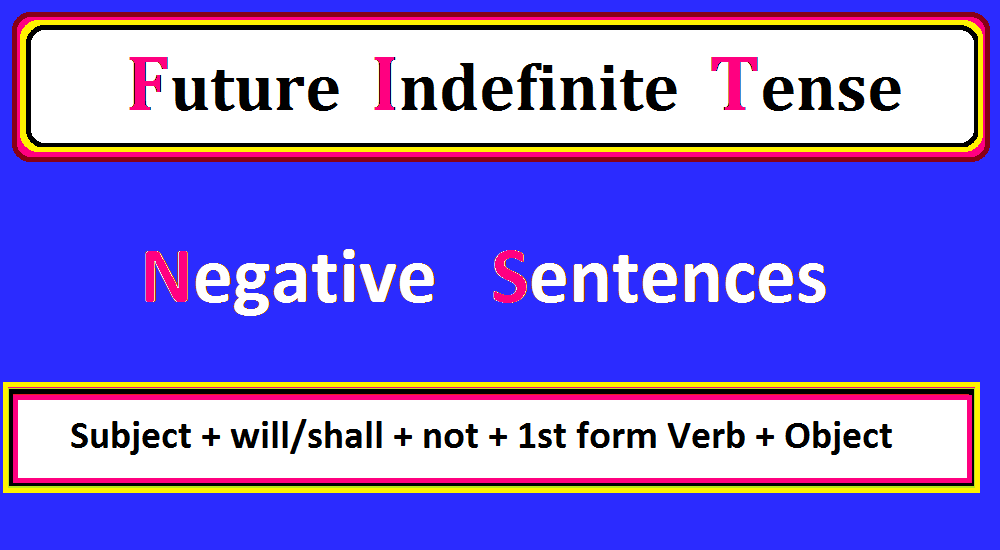
The formation of future indefinite tense for a negative sentence is given.
Negative Formula of Future Indefinite Tense:
The simple future tense negative formula is the following;
Subject + (Helping Verb) will/shall + not + 1st form of verb + Object
In the formation of negative sentences, understanding the negative formula for the future indefinite tense will help you create correct sentences.
Note Points:
There are some important points to form a negative sentence in the future simple tense;
- In negative sentences, the helping verb (will/shall) comes after the subject.
- “First form of the verb” is used in negative such as affirmative and interrogative sentences in the future simple.
- The word “not” is added after the auxiliary verb (will/shall) to show a negative sentence.
- A full stop (.) is placed at the end of a sentence such as a positive sentence in the future simple tense.
Negative Sentences Examples of Future Indefinite Tense:
Here are some examples of exercises for negative sentences in the future simple tense;
- He will not go to school tomorrow.
(Subject: He, Helping Verb: will, Add: not; Main Verb: go, Object: to school tomorrow)
- This horse will not run fast.
(Subject: This horse, Helping Verb: will, Add: not; Main Verb: run, Object: fast)
- I shall not go to collage by bus.
(Subject: I, Helping Verb: shall, Add: not; Main Verb: go, Object: to collage by bus)
- We shall not go to Karachi next week.
(Subject: We, Helping Verb: shall, Add: not; Main Verb: go, Object: to Karachi next week)
- You will not wait for me.
(Subject: You, Helping Verb: will, Add: not; Main Verb: wait, Object: for me)
- We shall not sell our house.
(Subject: We, Helping Verb: shall, Add: not; Main Verb: sell, Object: our house)
- They will not learn their lesson.
(Subject: They, Helping Verb: will, Add: not; Main Verb: learn, Object: their lesson)
- Birds will not fly in the air.
(Subject: Birds, Helping Verb: will, Add: not; Main Verb: fly, Object: in the air)
- Ali will not play hockey.
(Subject: Ali, Helping Verb: will, Add: not; Main Verb: play, Object: hockey)
- You will not take tea.
(Subject: You, Helping Verb: will, Add: not; Main Verb: take, Object: tea)
- We shall not finish our work.
(Subject: We, Helping Verb: shall, Add: not; Main Verb: finish, Object: our work)
- We shall not pray to God.
(Subject: We, Helping Verb: shall, Add: not; Main Verb: pray, Object: to God)
- He will not pay the fine.
(Subject: He, Helping Verb: will, Add: not; Main Verb: pay, Object: fine)
- The boys will not make a noise.
(Subject: The boys, Helping Verb: will, Add: not; Main Verb: make, Object: a noise)
- We shall not respect our parents.
(Subject: We, Helping Verb: shall, Add: not; Main Verb: respect, Object: our parents)
These sentences express denial, refusal, or negation of subsequent actions or events.
Conclusion:
Knowing how to use the future indefinite tense will help you communicate your thoughts more effectively and clearly when you are making plans, promises, or predictions.
Just use the base form of the verb with “will” or “shall” to make it.In English grammar, it helps form interrogative, negative, and positive or aggressive sentences in the future simple tense. So you will know how to tell the future the next time you discuss it!
